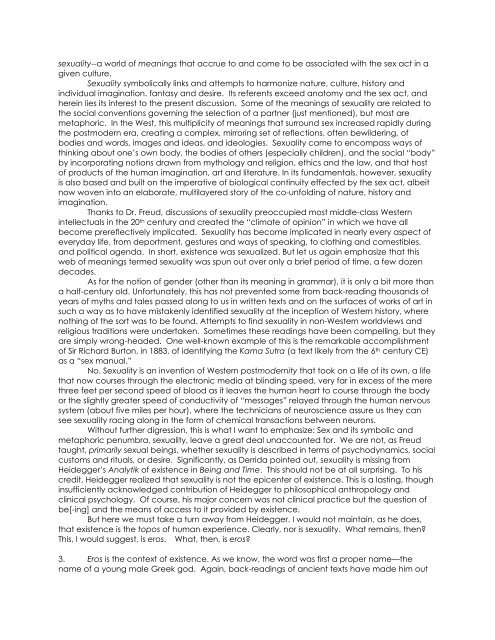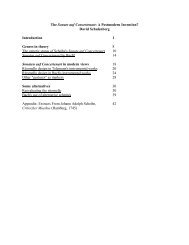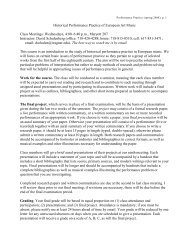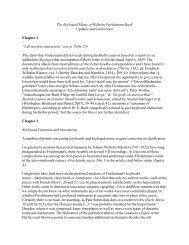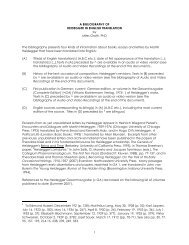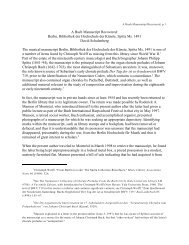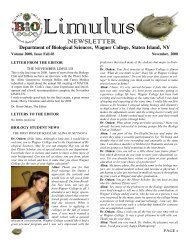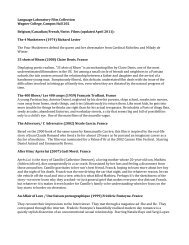SEVEN PAPERS ON EXISTENTIAL ANALYSIS ... - Wagner College
SEVEN PAPERS ON EXISTENTIAL ANALYSIS ... - Wagner College
SEVEN PAPERS ON EXISTENTIAL ANALYSIS ... - Wagner College
You also want an ePaper? Increase the reach of your titles
YUMPU automatically turns print PDFs into web optimized ePapers that Google loves.
sexuality--a world of meanings that accrue to and come to be associated with the sex act in a<br />
given culture.<br />
Sexuality symbolically links and attempts to harmonize nature, culture, history and<br />
individual imagination. fantasy and desire. Its referents exceed anatomy and the sex act, and<br />
herein lies its interest to the present discussion. Some of the meanings of sexuality are related to<br />
the social conventions governing the selection of a partner (just mentioned), but most are<br />
metaphoric. In the West, this multiplicity of meanings that surround sex increased rapidly during<br />
the postmodern era, creating a complex, mirroring set of reflections, often bewildering, of<br />
bodies and words, images and ideas, and ideologies. Sexuality came to encompass ways of<br />
thinking about one’s own body, the bodies of others (especially children), and the social “body”<br />
by incorporating notions drawn from mythology and religion, ethics and the law, and that host<br />
of products of the human imagination, art and literature. In its fundamentals, however, sexuality<br />
is also based and built on the imperative of biological continuity effected by the sex act, albeit<br />
now woven into an elaborate, multilayered story of the co-unfolding of nature, history and<br />
imagination.<br />
Thanks to Dr. Freud, discussions of sexuality preoccupied most middle-class Western<br />
intellectuals in the 20 th century and created the “climate of opinion” in which we have all<br />
become prereflectively implicated. Sexuality has become implicated in nearly every aspect of<br />
everyday life, from deportment, gestures and ways of speaking, to clothing and comestibles,<br />
and political agenda. In short, existence was sexualized. But let us again emphasize that this<br />
web of meanings termed sexuality was spun out over only a brief period of time, a few dozen<br />
decades.<br />
As for the notion of gender (other than its meaning in grammar), it is only a bit more than<br />
a half-century old. Unfortunately, this has not prevented some from back-reading thousands of<br />
years of myths and tales passed along to us in written texts and on the surfaces of works of art in<br />
such a way as to have mistakenly identified sexuality at the inception of Western history, where<br />
nothing of the sort was to be found. Attempts to find sexuality in non-Western worldviews and<br />
religious traditions were undertaken. Sometimes these readings have been compelling, but they<br />
are simply wrong-headed. One well-known example of this is the remarkable accomplishment<br />
of Sir Richard Burton, in 1883, of identifying the Kama Sutra (a text likely from the 6 th century CE)<br />
as a “sex manual.”<br />
No. Sexuality is an invention of Western postmodernity that took on a life of its own, a life<br />
that now courses through the electronic media at blinding speed, very far in excess of the mere<br />
three feet per second speed of blood as it leaves the human heart to course through the body<br />
or the slightly greater speed of conductivity of “messages” relayed through the human nervous<br />
system (about five miles per hour), where the technicians of neuroscience assure us they can<br />
see sexuality racing along in the form of chemical transactions between neurons.<br />
Without further digression, this is what I want to emphasize: Sex and its symbolic and<br />
metaphoric penumbra, sexuality, leave a great deal unaccounted for. We are not, as Freud<br />
taught, primarily sexual beings, whether sexuality is described in terms of psychodynamics, social<br />
customs and rituals, or desire. Significantly, as Derrida pointed out, sexuality is missing from<br />
Heidegger’s Analytik of existence in Being and Time. This should not be at all surprising. To his<br />
credit, Heidegger realized that sexuality is not the epicenter of existence. This is a lasting, though<br />
insufficiently acknowledged contribution of Heidegger to philosophical anthropology and<br />
clinical psychology. Of course, his major concern was not clinical practice but the question of<br />
be[-ing] and the means of access to it provided by existence.<br />
But here we must take a turn away from Heidegger. I would not maintain, as he does,<br />
that existence is the topos of human experience. Clearly, nor is sexuality. What remains, then?<br />
This, I would suggest, is eros. What, then, is eros?<br />
3. Eros is the context of existence. As we know, the word was first a proper name—the<br />
name of a young male Greek god. Again, back-readings of ancient texts have made him out


